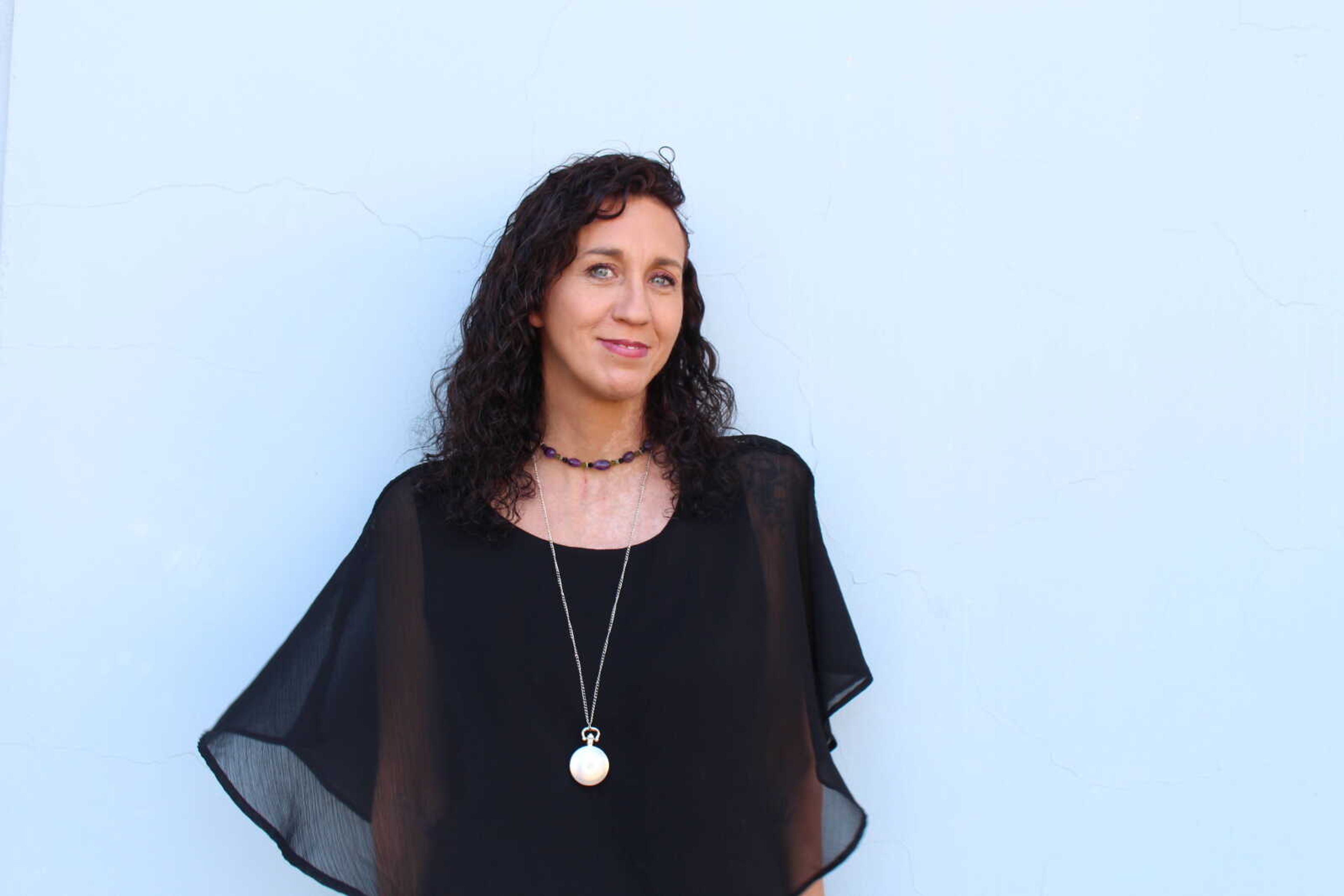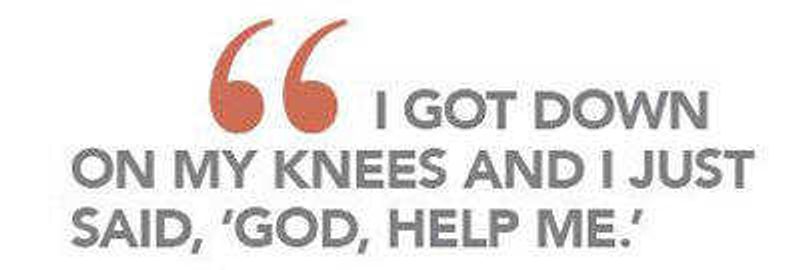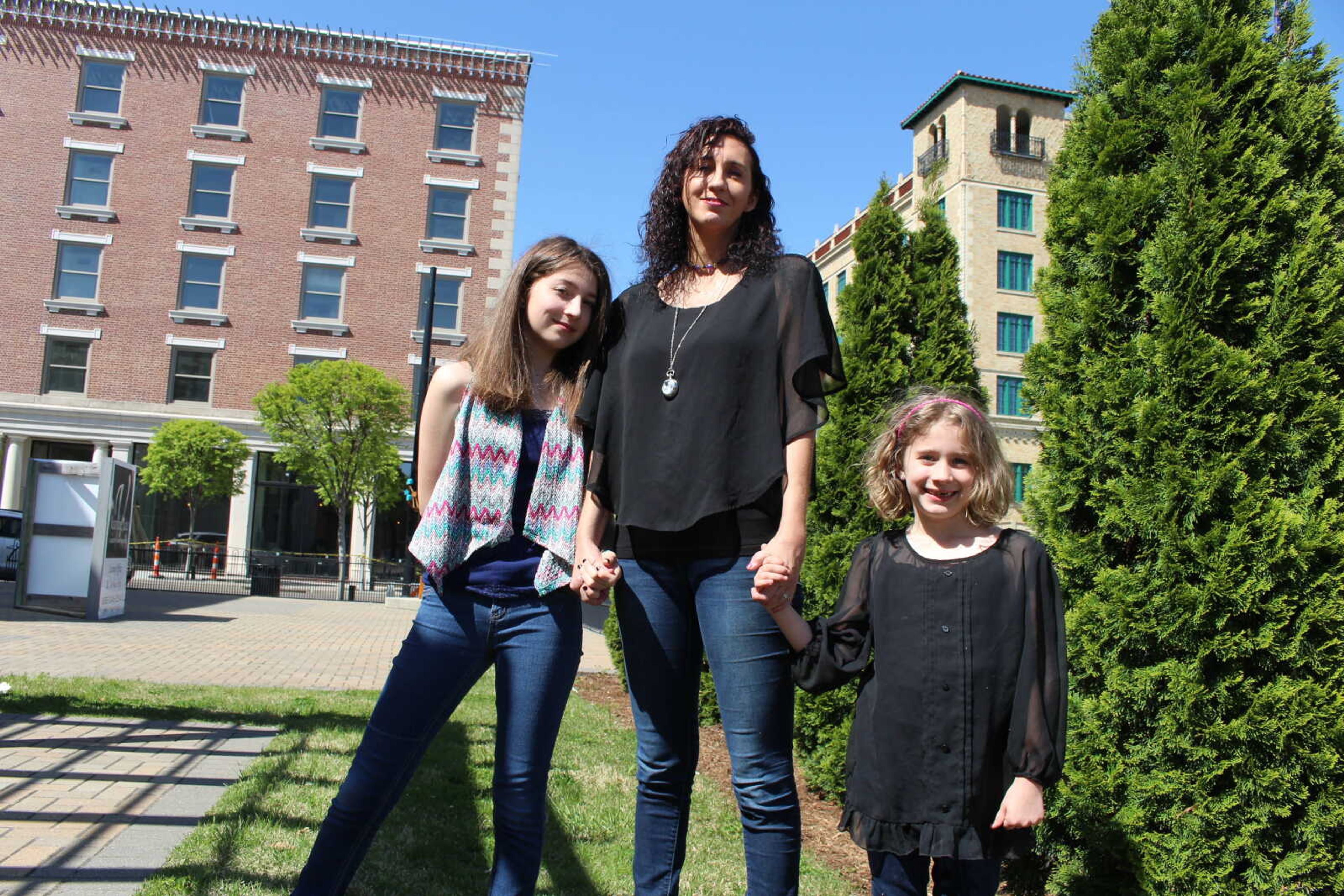Kristi Booth decided at a young age the world was a hurtful place. And with good reason.
​
The 43-year old Southeast graduate is a person in recovery from substance use disorder, something she said was amplified by her rheumatoid arthritis. Now, she’s a mother of two daughters, Zoe, 12, and Darci, 7, a university peer ambassador for the Missouri Recovery Network, leads the Friends of Recovery group on campus, organizes the Annual Recovery Walk in September and is an advocate for legislation that would help create resources for people with substance use disorder.

​
And while she vowed to her husband she would not work in recovery, Booth finished earning her degree in social work from Southeast in December.
But long before she was an advocate for those with substance use disorder, Booth had a long, dark journey with her own substance use disorder.
She was in and out of jail after “getting busted” when she was making methamphetamine with a former boyfriend. After being released from one of her five stays in jail, Booth returned home to live with her mother. It was then that she began “main lining” the gel in fentanyl pain patches— prescribed for her rheumatoid arthritis— to shoot up. This form of drug use Booth said was “very dangerous” because it had the potential to send a clot to her heart. Because of her medical condition, Booth said she could “get the doctors to give her anything” she wanted.
She overdosed time and again. She recalled one particular instance of overdose in 2003 when Booth said she remembers regaining consciousness to the sound of someone telling her, “You’re going to die if you keep doing this.”
It was then Booth decided she didn’t want to die.
The next day, she called Family Counseling Center and began taking the first steps to recovery.
It was in a 12-step program where Booth met her now husband, who she described as “a very generous, loving man” who was “completely different than any other man” in her life.

After nearly nine years without drugs, Booth said she had a flare up of arthritis which caused her to have to take prescription pain medication. Because she was part of an abstinence-based recovery program, Booth said she didn’t want to tell anyone about what she was going through.
She experienced a recurrence with substance use disorder. Thanks to a push from her husband, Booth called the Gibson Recovery Center.
Her new date which marks the time since she last used is Nov. 23, 2013.
But Booth lived a lifetime of darkness before she would arrive at her new date in 2013. During the years when her substance use disorder controlled her life, she said her drug of choice was “everything and more.”
It all started when she took her first drink of alcohol at age 5. She was repeatedly molested by her grandfather, and Booth said she remembered how the alcohol was the only thing that made her feel good.
“I didn’t know how to cope with it,” Booth said.
She had even more to contend with when, in her early adolescent years, she was forced to become a parent in her mother’s absence.
She said her mother, then addicted to prescription medication, was “knocked out” for most of Booth’s childhood, spent in Cape Girardeau. Cooking, cleaning and getting herself to school each day became her responsibilities.
In her high school years, Booth said she was raped by “multiple people.” She was even in a coma after an incident where she tried to take her own life. A few weeks after having her stomach pumped from that incident, Booth returned to school where she said she tried to lay low and avoid her rapist in the halls.
Eventually, Booth said she took a safety razor to her wrists. She just wanted the pain to stop.
That’s when her mother offered another dark alternative to her pain. She handed Booth a bottle of pills.
“‘If you really want to die, you can take this bottle of pills and go to sleep and never wake up,’” Booth recounted her mother having said to her.
She said she didn’t want to die, she just wanted help.
Her mother took her to the hospital, where Booth told a nurse what her mother had offered her. It was then Booth was taken from her mother’s custody “because, quite clearly, she was unfit” to raise her any longer.
She went into the foster system where she stayed until she aged out at 17. Her social worker had been helping her get disability money for her rheumatoid arthritis, a condition she’d had since she was a baby. That money, along with the child support her father paid to the state, allowed Booth to get her first apartment by herself.
“As soon as I got out, that’s when the party began,” Booth said.
It was then Booth said she began using illicit drugs. Alcohol, marijuana and LSD were the drugs she said she used most often.
It was after she began touring with the Grateful Dead and hitchhiking across the country that Booth said she found methamphetamine.
“That’s when it wasn’t fun anymore,” Booth said.
Booth said she weighed 89 pounds the last time she was arrested for methamphetamine, back in 2002.
She said methamphetamine, which she began using in1994, led her to meet her then boyfriend— the one who helped get her in trouble with the law— the man who would come to abuse her mentally, physically and psychologically.
It wasn’t until Booth became pregnant by her abusive boyfriend that she realized she could not control her drug usage. Until her pregnancy, she said she had been on probation, in and out of treatment centers and jails.
Despite her best efforts, she couldn’t stop using.
“I realized this was something other than me just doing what I wanted,” Booth said. “This was something I had to do.”
Her baby, named Noah, lived for only two weeks. Booth said he died from complications of her drug abuse.
It was the first time in her life that Booth said she had ever felt a true, unconditional love. Having Noah gave her hope in an otherwise dark time.
Booth stayed with her boyfriend despite many instances of domestic violence. Booth said they both spent time behind bars for a drug bust, her in jail and him in a federal prison in Kansas.
During her time in jail, Booth said she met a woman who was getting ready to leave prison who told her about God. And although Booth’s father was a pastor and she’d known God in some sense, she never had a meaningful relationship with him.
“I told her that I didn’t ask for God to help me when I was doing what I wanted to do, I’m not going to ask him to help me when I’m in trouble,” Booth said.
But Booth said the woman “had this light about her” and it made her reconsider.
“I got down on my knees and I just said, ‘God, help me,’” Booth said. “I believe that was the moment the door was opened.”
Today, Booth said she tries to be honest about her life experience with her children whom she said are genetically predisposed to have substance use disorder.

Her daughter Zoe, Booth said, has even thanked her for her honesty and says her friends don’t have the same understanding about the world that she does.
That different perspective and understanding of the world is something Booth hopes more people possess after hearing her story.
“People with substance use disorders are just people,” Booth said. “We just have a neurological disorder that’s got us not living right, not making good decisions. Whenever we have the substance in our system we lose the power of choice.”
Booth said substance use disorder is a mental health issue, and she hopes to change the stigma surrounding how people understand addiction.
Despite the darkness of her past, Booth has found a way to use her story to help others, something she always wanted to do with her life.
“All that crap I went through...I know that there was a reason,” Booth said. “God loves me and God’s going to use me.”
Booth credits much of her recovery to her faith in God. She said she called on him many times and he “showed up and showed out.”
Booth said she isn’t sure there are many things that could have stopped her from using drugs because of how much trauma she faced as a child. But after a lifetime of consequences from using, she knows how important prevention is in the fight against the opioid epidemic.
Prevention, she said, needs to be the first step.
In her own life, Booth said she continues to take measures of prevention. She has had to have surgeries which require her to use pain medication. But Booth said she now has people in place to support her. She doesn’t hold the pain medication and has sponsors to help hold her accountable.
She also acknowledged the role of big pharmaceutical companies in her journey with substance use disorder, claiming they encouraged physicians to over-prescribe medication to make a profit without worrying about the lives affected.
Booth said those who struggle with substance use disorder need money for recovery, not just treatment. After receiving treatment, she said, they are put right back into the environments in which they developed their disorders. Recovery in those cases can be impossible, Booth said.
The very thing which nearly took her life time and again is now at the heart of her campaign for justice and recovery.
“It was worth it, it really was. If I can help one person, it was worth it,” Booth said.





